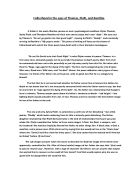Roethke called his greenhouses “both heaven and hell” (Paglia). He explained that the overwhelming beauty of the plants was soothing but keeping them alive was hard work and even as a child he struggled emotionally when a plant did not survive. One poem in particular written by Roethke “The Geranium” shows its readers a tortured relationship with a plant and the struggle to keep it alive. In one of his many notebooks that he kept, he asked himself, “What was the greenhouse? It was a jungle, and it was paradise; it was order and disorder” (Paglia). These greenhouses and his experiences in nature left such an imprint in Roethke’s mind that stuck with him for his entire life. In an article written by an unknown author, it is stated, “By scrutinizing the plants, flowers, and creatures, Roethke attempted to tie the world of greenhouses to the inner world of man” (“Theodore Roethke”).
In his poem “Child on Top of a Greenhouse” you can sense the creative connection to his childhood. He relives a childhood journey of a simple storm that he is witnessing. This storm had him worried for the safety of the plants and greenhouses. Roethke writes, “The wind billowing out the seat of my britches…The half-grown chrysanthemums staring up like accusers…“ (Roethke 41). He continues on as he compares the trees to horses, “A line of elms plunging and tossing like horses” (Roethke 41). Reading his poetry truly gives you an idea of how emotionally connected he was to the plants in his greenhouses.
Roethke’s book of poems entitled The Greenhouse Poems, just so happened to give him his breakthrough in poetry. It was then that he realized “the organic process of plants could stand as a metaphor for the poetic enterprise itself, each poem taking its own sensuous form and intrinsic shape” (Hirsch). Much of the poetry he wrote after The Greenhouse Poems contained content relating to nature and his particular experiences with plant life.
In 1922 Roethke’s father and uncle sold their greenhouse after a family dispute. A few months later Roethke’s uncle committed suicide and within the next year his father died of cancer. From that day on Roethke accepted his father’s responsibilities as his own. These traumatic series of events also helped greatly to shape Roethke’s writings. His father’s death profoundly impacted Roethke. He directed his emotions related to the death of his father towards his second book of poetry. “Lost Son” is one amongst other titles in this book. “Lost Son” is a deeply written poem in which he combines his pain of missing his father with his love for nature. He writes, “Appear in the form of a spider, Or a moth beating the curtain, Which is the way I take, Out of what door do I go, Where and to whom” (Roethke 50). Another poem influenced by his father, “My Papa’s Waltz”, is about a hard working father who has had a few drinks and is “dancing” with his son. Some readers could argue that this poem is about an abusive father, but Roethke clearly writes the poem as a happy memory of a son who clearly misses his father.
Roethke described his father as “Prussian to the bones” (Paglia). He also said he was “an intimidating godlike figure who nevertheless had an artistic streak” (Paglia). He explains further that he was an extreme disciplinarian but in the greenhouse he showed high sensitivity to the beauty of nature. Roethke had a hard time understanding his father due to his tendency to hide his vulnerable side. It seemed as though the memory of his father’s death loomed over him for his entire life. He is said to having felt “angered and abandoned” when his father passed away (“Contemporary Authors”). Another poem named after his father, “Otto” held some strong words, "Who loves the small can be both saint and boor, (And some grow out of shape, their seed impure ;) The Indians loved him and the Polish poor” (Roethke 216). This poem shows Roethke’s respect towards his father.
Theodore Roethke is an extremely talented poet. He has won many prizes and awards for his creative poetry and it is said that only about three percent of his writing was actually published. One can only imagine the other great poems that are in his personal notebooks. His childhood in the greenhouse environments with his father have fueled his extremely creative vision for poetry which has exuberated through the pages of his works.
Works Cited
"Theodore Roethke." Contemporary Authors Online. 2009. Web. 10 Apr. 2011.
Edward Hirsch. "Theodore Roethke (1908-1963) .. :[FINAL Edition]. " The Washington Post 10 Oct. 2004, ProQuest Newsstand, ProQuest. Web. 10 Apr. 2011.
Harris, Jan. "Theodore Roethke." Literature Online Biography. Literature Online - Marketing Site. Web. 7 Apr. 2011. <http://lion.chadwyck.com/searchFulltext.do?id=BIO001819>.
Paglia, C.. "Dance of the Senses: Natural Vision and Psychotic Mysticism in Theodore Roethke's Poetry. " Michigan Quarterly Review 48.1 (2009): 1-16. Research Library, ProQuest. Web. 10 Apr. 2011.
Roethke, Theodore. The Collected Poems of Theodore Roethke. Garden City, NY: Anchor, 1975. Print.
Seager, Allan. The Glass House: The Life of Theodore Roethke. New York: McGraw-Hill, 1968. Print.








